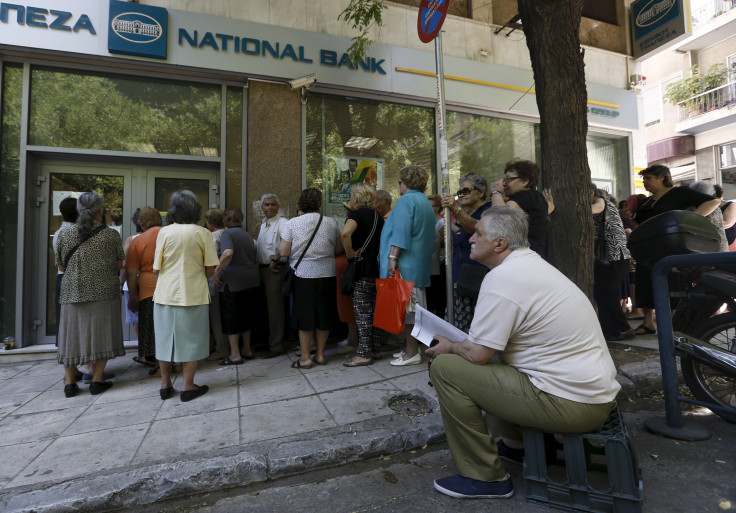Greece Submits Proposal To Avert Exit From Eurozone That Includes Tax Hikes, Pension Cuts

With just two hours left before a midnight deadline, the Greek government on Thursday submitted its proposal to European creditors for the terms of a third bailout package that would avert the country’s imminent exit from the 19-state eurozone monetary union. The proposal includes up to 13 billion ($14.4 billion) worth of austerity measures, including sales tax hikes and pension cuts, in return for a bailout worth 53.5 billion euros ($59 billion).
A spokesman for Dutch Eurogroup President Jeroen Dijsselbloem tweeted that the proposals were received and that it was "important for institutions to consider these in their assessment" of the situation.
New Greek proposals received by #Eurogroup president @J_Dijsselbloem, important for institutions to consider these in their assessment
— Michel Reijns (@MichelReijns) July 9, 2015Greek banks and the local stock market have been closed since June 29, and the account holders have been prevented from withdrawing more than 60 euros ($66) a day from ATMs. Greek banks are expected to be closed on Monday.
Meanwhile, Greek pensioners who don’t have bank cards have been hardest hit because they don’t have access to funds. ATMs are routinely short of 20 euro notes, which means many have had their money rations cut to 50 euros a day.
Experts from the European Commission, the European Central Bank and the International Monetary Fund (known as the “troika”) will weigh the viability of the proposal, and the Greek Parliament will vote to make the measure law on Friday. Leaders of the 28-member European Union will review the proposal over the weekend and will meet Sunday to decide if Greek Prime Minister Alexis Tsipras’ proposed measures are enough to satisfy demands.
If the proposal for the three-year bailout loan is satisfactory, European leaders could vote and make the measure law next week, according to Reuters. If not, Greece could bow out of the eurozone.
This would be Greece’s third bailout package since 2010; the new proposal is vital to allowing Greece to make a loan payment to the European Central Bank on July 20. On June 30, Greece defaulted on a payment of 1.6 billion euros ($1.76 billion) to the International Monetary Fund.
The proposed austerity measures are greater than the ones rejected by Greek voters in a July 5 referendum. Greek lawmakers could approve the new proposal on Friday to avoid bankruptcy.
"The realistic proposal from Greece will have to be matched by an equally realistic proposal on debt sustainability from the creditors. Only then will we have a win-win situation," Donald Tusk, who heads the European Council, told the media on Thursday.
Some of the measures Greece is proposing include, according to Reuters.
* The value-added tax rate for restaurants and catering would be 23 percent, while it would be 13 percent for hotels;
* Elimination of value-added tax breaks for islands by the end of 2016;
* Some pension benefits would be gradually phased out by the end of 2019;
* Changes to the collective bargaining system by the fourth quarter of 2015 that would be more favorable to business interests; and
* Higher corporate and shipping company taxation.
© Copyright IBTimes 2025. All rights reserved.






















